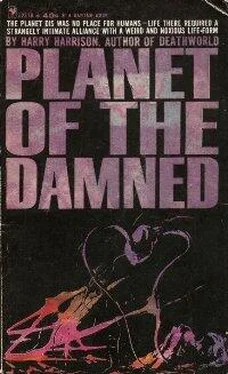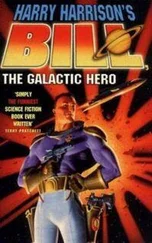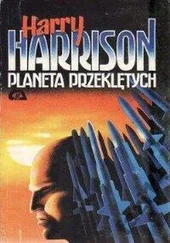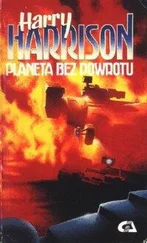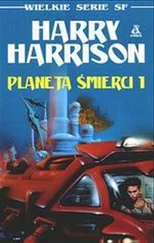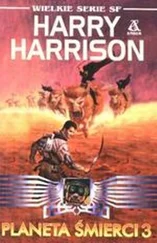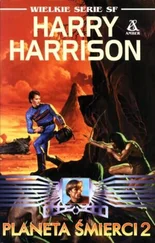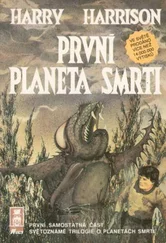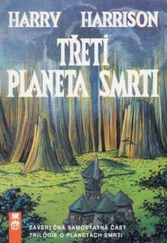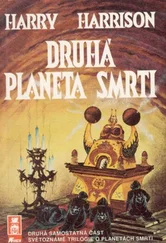Harry Harrison - Planet of the Damned
Здесь есть возможность читать онлайн «Harry Harrison - Planet of the Damned» весь текст электронной книги совершенно бесплатно (целиком полную версию без сокращений). В некоторых случаях можно слушать аудио, скачать через торрент в формате fb2 и присутствует краткое содержание. Год выпуска: 1962, Издательство: Bantam, Жанр: Фантастика и фэнтези, на английском языке. Описание произведения, (предисловие) а так же отзывы посетителей доступны на портале библиотеки ЛибКат.
- Название:Planet of the Damned
- Автор:
- Издательство:Bantam
- Жанр:
- Год:1962
- ISBN:нет данных
- Рейтинг книги:5 / 5. Голосов: 1
-
Избранное:Добавить в избранное
- Отзывы:
-
Ваша оценка:
- 100
- 1
- 2
- 3
- 4
- 5
Planet of the Damned: краткое содержание, описание и аннотация
Предлагаем к чтению аннотацию, описание, краткое содержание или предисловие (зависит от того, что написал сам автор книги «Planet of the Damned»). Если вы не нашли необходимую информацию о книге — напишите в комментариях, мы постараемся отыскать её.
and
. Brion has just won the Twenties, a global competition that tests one’s achievements in 20 categories of human activities. But Brion must leave his world to help salvage the world of Dis, the most hellish planet in the galaxy.
Also published as
.
Nominated for the Hugo Award for Best Novel in 1962.
Planet of the Damned — читать онлайн бесплатно полную книгу (весь текст) целиком
Ниже представлен текст книги, разбитый по страницам. Система сохранения места последней прочитанной страницы, позволяет с удобством читать онлайн бесплатно книгу «Planet of the Damned», без необходимости каждый раз заново искать на чём Вы остановились. Поставьте закладку, и сможете в любой момент перейти на страницу, на которой закончили чтение.
Интервал:
Закладка:
Outside, the afternoon sun shimmered weakly in a dark sky. The endless ice fields soaked up the dim light, reflecting it back as a colder and harsher illumination. A single figure on skis cut a line across the empty plain; nothing else moved. The depression of the ultimate fatigue fell on Brion and everything changed, as if he looked in a mirror at a previously hidden side.
He saw suddenly—with terrible clarity—that to be a Winner was to be absolutely nothing. Like being the best flea, among all the fleas on a single dog.
What was Anvhar after all? An ice-locked planet, inhabited by a few million human fleas, unknown and unconsidered by the rest of the galaxy. There was nothing here worth fighting for; the wars after the Breakdown had left them untouched. The Anvharians had always taken pride in this—as if being so unimportant that no one else even wanted to come near you could possibly be a source of pride. All the other worlds of man grew, fought, won, lost, changed. Only on Anvhar did life repeat its sameness endlessly, like a loop of tape in a player…
Brion’s eyes were moist; he blinked. Tears! Realization of this incredible fact wiped the maudlin pity from his mind and replaced it with fear. Had his mind snapped in the strain of the last match? These thoughts weren’t his. Self-pity hadn’t made him a Winner—why was he feeling it now? Anvhar was his universe—how could he even imagine it as a tag-end planet at the outer limb of creation? What had come over him and induced this inverse thinking?
As he thought the question, the answer appeared at the same instant. Winner Ihjel. The fat man with the strange pronouncements and probing questions. Had he cast a spell like some sorcerer—or the devil in Faust? No, that was pure nonsense. But he had done something. Perhaps planted a suggestion when Brion’s resistance was low. Or used subliminal vocalization like the villain in Cerberus Chained. Brion could find no adequate reason on which to base his suspicions. But he knew, with sure positiveness, that Ihjel was responsible.
He whistled at the sound-switch next to his pillow and the repaired communicator came to life. The duty nurse appeared in the small screen.
“The man who was here today,” Brion said, “Winner Ihjel. Do you know where he is? I must contact him.”
For some reason this flustered her professional calm. The nurse started to answer, excused herself, and blanked the screen. When it lit again a man in guard’s uniform had taken her place.
“You made an inquiry,” the guard said, “about Winner Ihjel. We are holding him here in the hospital, following the disgraceful way in which he broke into your room.”
“I have no charges to make. Will you ask him to come and see me at once?”
The guard controlled his shock. “I’m sorry, Winner—I don’t see how we can. Dr Caulry left specific orders that you were not to be—”
“The doctor has no control over my personal life.” Brion interrupted. “I’m not infectious, nor ill with anything more than extreme fatigue. I want to see that man. At once.”
The guard took a deep breath, and made a quick decision. “He is on the way up now,” he said, and rung off.
“What did you do to me?” Brion asked as soon as Ihjel had entered and they were alone. “You won’t deny that you have put alien thoughts in my head?”
“No, I won’t deny it. Because the whole point of my being here is to get those ‘alien’ thoughts across to you.”
“Tell me how you did it,” Brion insisted. “I must know.”
“I’ll tell you—but there are many things you should understand first, before you decide to leave Anvhar. You must not only hear them, you will have to believe them. The primary thing, lie clue to the rest, is the true nature of your life here. How do you think the Twenties originated?”
Before he answered, Brion carefully took a double dose of the mild stimulant he was allowed. “I don’t think,” he said; “I know. It’s a matter of historical record. The founder of the games was Giroldi, the first contest was held in 378 A.B. The Twenties have been held every year since then. They were strictly local affairs in the beginning, but were soon well established on a planet-wide scale.”
“True enough,” Ihjel said. “But you’re describing what happened. I asked you how the Twenties originated. How could any single man take a barbarian planet, lightly inhabited by half-mad hunters and alcoholic farmers, and turn it into a smooth-running social machine built around the artificial structure of the Twenties? It just couldn’t be done.”
“But it was done!” Brion insisted. “You can’t deny that. And there is nothing artificial about the Twenties. They are a logical way to live a life on a planet like this.”
Ihjel laughed, a short ironic bark. “Very logical,” he said; “but how often does logic have anything to do with the organization of social groups and governments? You’re not thinking. Put yourself in founder Giroldi’s place. Imagine that you have glimpsed the great idea of the Twenties and you want to convince others. So you walk up to the nearest louse-ridden, brawling, superstitious, booze-embalmed hunter and explain clearly how a program of his favourite sports—things like poetry, archery and chess—can make his life that much more interesting and virtuous. You do that. But keep your eyes open at the same time, and be ready for a fast draw.”
Even Brion had to smile at the absurdity of the suggestion. Of course it couldn’t happen that way. Yet, since it had happened, there must be a simple explanation.
“We can beat this back and forth all day,” Ihjel told him, “and you won’t get the right idea unless—” He broke off suddenly, staring at the communicator. The operation light had come on, though the screen stayed dark. Ihjel reached down a meaty hand and pulled loose the recently connected wires. “That doctor of yours is very curious—and he’s going to stay that way. The truth behind the Twenties is none of his business. But it’s going to be yours. You must come to realize that the life you lead here is a complete and artificial construction, developed by Societies experts and put into application by skilled field workers.”
“Nonsense!” Brion broke in. “Systems of society can’t be dreamed up and forced on people like that. Not without bloodshed and violence.”
“Nonsense, yourself,” Ihjel told him. “That may have been true in the dawn of history, but not any more. You have been reading too many of the old Earth classics; you imagine that we still live in the Ages of Superstition. Just because fascism and communism were once forced on reluctant populations, you think this holds true for all time. Go back to your books. In exactly the same era democracy and self-government were adapted by former colonial states, like India and the Union of North Africa, and the only violence was between local religious groups. Change is the lifeblood of mankind. Everything we today accept as normal was at one time an innovation. And one of the most recent innovations is the attempt to guide the societies of mankind into something more consistent with the personal happiness of individuals.”
“The God complex,” Brion said; “forcing human lives into a mould whether they want to be fitted into it or not.”
“Societies can be that,” Ihjel agreed. “It was in the beginning, and there were some disastrous results of attempts to force populations into a political climate where they didn’t belong. They weren’t all failures—Anvhar here is a striking example of how good the technique can be when correctly applied. It’s not done this way any more, though. As with all of the other sciences, we have found out that the more we know, the more there is to know. We no longer attempt to guide cultures towards what we consider a beneficial goal. There are too many goals, and from our limited vantage point it is hard to tell the good ones from the bad ones. All we do now is try to protect the growing cultures, give a little jolt to the stagnating ones—and bury the dead ones. When the work was first done here on Anvhar the theory hadn’t progressed that far. The understandably complex equations that determine just where in the scale from a Type I to a Type V a culture is, had not yet been completed. The technique then was to work out an artificial culture that would be most beneficial for a planet, then bend it into the mould.”
Читать дальшеИнтервал:
Закладка:
Похожие книги на «Planet of the Damned»
Представляем Вашему вниманию похожие книги на «Planet of the Damned» списком для выбора. Мы отобрали схожую по названию и смыслу литературу в надежде предоставить читателям больше вариантов отыскать новые, интересные, ещё непрочитанные произведения.
Обсуждение, отзывы о книге «Planet of the Damned» и просто собственные мнения читателей. Оставьте ваши комментарии, напишите, что Вы думаете о произведении, его смысле или главных героях. Укажите что конкретно понравилось, а что нет, и почему Вы так считаете.
